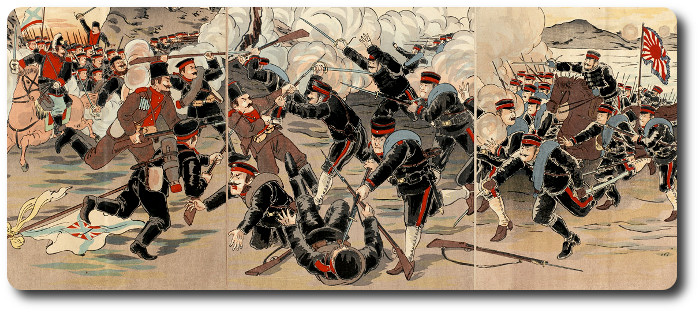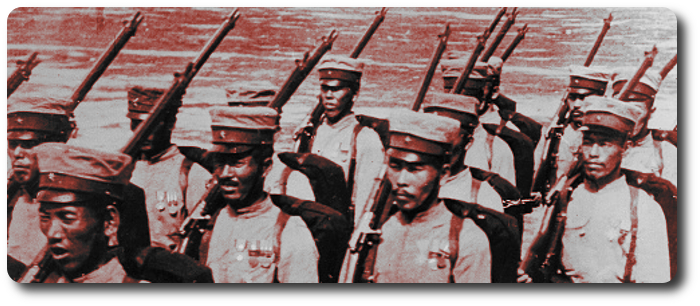Topic: Cold Steel

Lesson For Our Army (1906)
Russian Army's Notes Officially Distributed
Fire of Modern Infantry Wasteful of Ammunition
Practice in Estimating Distance Needed
Captain Soloviev's Views Regarded of Great Value
Boston Evening Transcript, 14 November 1906
Washington, Nov. 14—From the foreign officers who were attached to the opposing armies as observers in the Russo-Japanese War the world has received many valuable reports concerning the operations in Manchuria, the condition and conduct of the troops engaged and other subjects of general military interest. Several officers of the contending armies have also contributed to this fund of information, and one of these, Captain L.Z. Soloviev, of the Thirty-fourth East Siberian Rifle Regiment, has prepared a paper entitled "Actual Experiences in the War—Battle Action of the Infantry—Impressions of a Company Commander," which is of such importance that it has been translated into English by order of the general staff for distribution among the officers of the United States Army. "This officer," says the general staff, in an official memorandum, "has shown such a keen and appreciative observation in his description of great battles as seen from a company commander's point of view, and his remarks cover so many moot questions in regard to the battle tactics of today, that the little work has been deemed worthy of publication in English for distribution to the army."
What particularly impressed Captain Soloviev was the fact that many of the things he had to do in battle were not what he had been taught, and that much he had been taught was not applicable to combat, which may or may not be a blow to "military education" derived from the books. According to the regulations, the observer says, "effective rifle fire began at a range of from 1000 to 1400 paces," whereas rifle fire was found to be effective at a range of 2333 yards. Attention is called to the difficulty of keeping fire discipline well in hand during a battle, and of maintaining a reasonable and well sustained fire—difficulties which are increased during the fight. He says: "Sometimes a man will fire in his sleep and hundreds of shots follow, thus bringing about a useless loss of cartridges, a sleepless night, fatigue, nervous tension, wounded and killed by stray bullets, and there is before the men the prospect of days in battle."
Another thing that struck this observer was the extreme wastefulness of rapid fire. He states that one infantry regiment at Liao-Yang fired 1,200,000 cartridges, a vast expenditure that charred the stocks of the rifles and distorted the ends of the bayonets from the heat. Captain Soloviev asks if it would not be better to fire more slowly, with greater accuracy and better aim. The mass of fire takes place of accuracy while the short term of service tells upon the trueness of aim. It is difficult, too, to determine the distance of the objective, there remains as a principal means the eyesight, a mode of range finding that was used most frequently and by which the firing had to be guided. "This is why," adds the writer, "we deem it most important that during peace time frequent exercises should stake place in estimating distances by the eye, taking advantage of each favorable occasion, and not treating it as a tedious formality." One serious result observed during the campaign was the frequent deterioration of rifles caused by such intense fire, and it is observed there is only one means of replacing the disabled rifle in battle—the utilization of the pieces belonging to the killed and wounded. The local conditions of dust, rains and changes in temperature contribute top this disastrous end.
Captain Soloviev places a high estimate on the value of the bayonet as an infantry weapon, declaring that the late war "demonstrated most vividly all its power and moral importance, which, it is probable, it will maintain unaltered as long as there are wars." More than once there were fierce hand-to-hand fights, when the Russian depended upon their bayonets and used them with success, although there are no statistics to show the vital effect of such raids. There were instances where lines of intrenchments were taken with the bayonet as at Tumilin Pass. At another time "a bayonet fight was raging along the entire front of our enemy," when an entire corps fought with the bayonet. Captain Soloviev says the data on losses caused by the bayonet are very convincing, and that the losses "are almost as large as those caused by artillery fire, in spite of the enormous development of the latter."
Of the general characteristics of modern infantry combat, Captain Soloviev says: "Speaking of the characteristics of modern infantry combat, we note the following general traits:—
- the deployment of large units as a skirmish line;
- the absence of small partial reserves; the desire to develop at once the greatest intensity of fire;
- the advance of skirmishers at a run, bent double, and sometimes creeping;
- the advance under effective fire, one by one; the movement in the zone of fire in chain formation;
- the difficulty of controlling fire discipline and the necessity of developing fire discipline in time of peace;
- the unparalleled development of ammunition;
- the necessity for an uninterrupted supply of cartridges to the fighting line, and a close touch of regiments to the artillery parks;
- the deterioration of rifles and the necessity of replacing them frequently, as a rule;
- enormous losses in infantry combat, and the tenacity and duration of infantry combats without decisive results."

Captain Soloviev speaks in praise of the Japanese infantry and artillery. Emphasis is laid on the fact that a new factor in artillery combat was the firing against invisible targets, for in battles the battery does not see its opponent. The Japanese had apparently adopted the rule of ceasing fire under well-aimed fire of the enemy. If the Russian battery found the range of the Japanese battery and aimed well the Japanese immediately sought to change its position unawares. Captain Soloviev pronounces the Japanese infantry as far behind the Japanese artillery in accuracy of aim. The Japanese rifleman is described as a veritable machine-gun, on account of the rapidity with which he loads and fires his rifle, but most of the shots go high, and there was dexterity without aim too often. The Russian rifle appears to have been a satisfactory weapon, but the revolver was useless beyond seven paces, while the infantry sword is of little value. The supply of food was sufficient, and much praise was bestowed upon the system of the wheeled field kitchen, a provision for furnishing hot food to the soldier wherever he may be and for which method the commissary general of our own army has been striving indefatigably. It is remarked that more than one of these kitchens bore the marks of bullets.
In view of the modern effort at invisibility in military dress and equipment, it is interesting to know that Captain Soloviev found that quality to be the principal characteristic of the field. His first experience in battle produced a sense of insecurity and irresolution. He heard the bullets, but he saw no trenches or fortifications or enemy. He found the soldier in battle of "astounding simple and everyday demeanor, with betrayal of nervousness only in his rapid firing," in which condition the officer in command comes to his great task of controlling the men. The tension is terrible with the protracted battles of the day, and the demand upon the mental and physical powers is unrelaxing.

